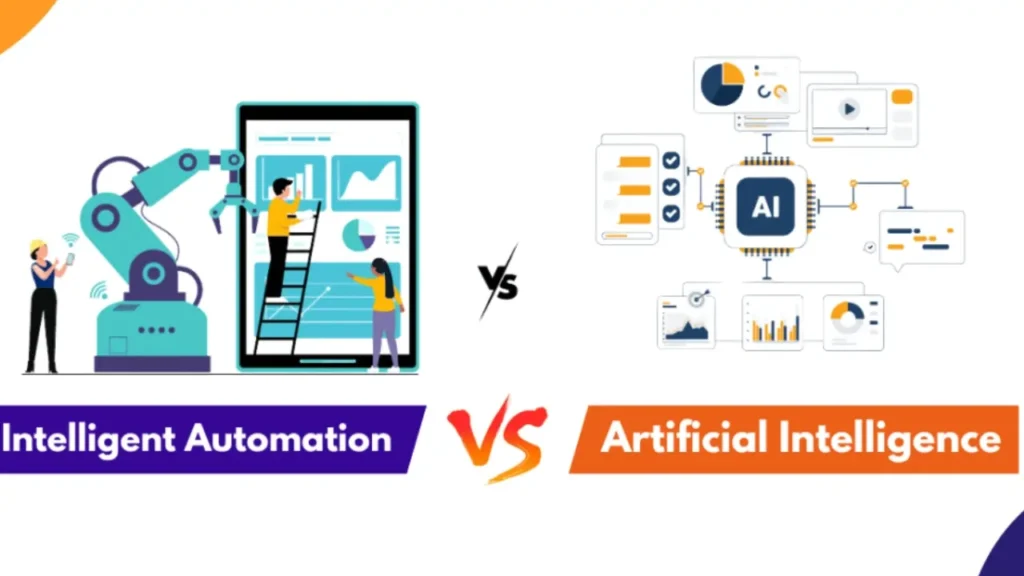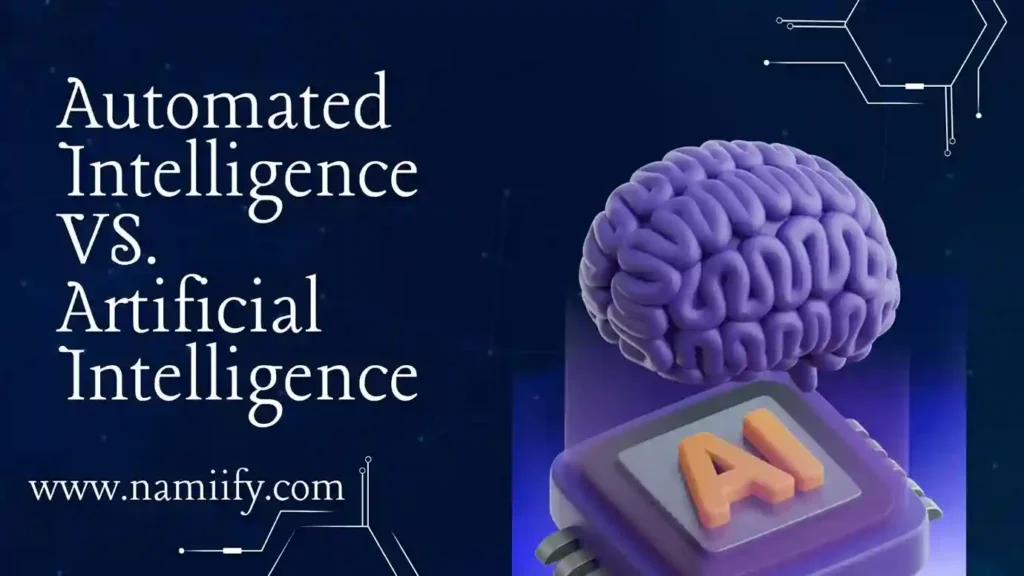Introduction
When we listen to words such as “automated intelligence” and “artificial intelligence” they may seem quite similar. But these two concepts are not one and the same! It is vital to know the distinctions in order to remain competitive in the modern world defined by information technology. To enable readers to better understand this kind of discussion, in this article, we shall also discuss five key distinctions between automated intelligence and artificial intelligence.
What is Automated Intelligence?
Auto – intelligence simply means a process where machines or computers are employed to execute tasks instead of human beings. These tasks tend to involve, follow or be governed by procedures that are in some way predetermined. Pretend we are having a machine perform a particular function over and over again it does not require to reason like a human.
Examples of Automated Intelligence:
- Each e-mail that is automatically sorted as spam and directly moved to the junk folder.
- Robots in the manufacturing segment of automotive industries.
- Smart lighting systems used in special time intervals in smart homes.
What is Artificial Intelligence?
On the other hand, artificial intelligence (AI) refers the system that tries to emulate human intelligent behavior. They teach, negotiate and make choice based on data. AI stands for artificial intelligence while automated intelligence cannot progress for the better.
Examples of Artificial Intelligence
- Useful information sources such as a range of webpages that include a chatbot, for example, ChatGPT, which answers your questions.
- Personalized recommendations at Netflix or Amazon.
- Devices with voice recognition like the AI-based products: Siri or Alexa.
Automated Intelligence vs. Artificial Intelligence: The Key Differences

1. Learning Capability:
- Automated Intelligence: Does not learn or adapt. However, it operates in sets to pre-programmed specific course of action.
- Artificial Intelligence: Can get better after being exposed to solutions, and develop new strategies to use in new situations if any.
2. Decision-Making Ability:
- Automated Intelligence: Can only make decisions in certain terms of reference and for clearly defined functions.
- Artificial Intelligence: Can properly evaluate data and make recommendation for action in a number of situations including scenarios it has not come across before.
3. Complexity:
- Automated Intelligence: Applies on simple tasks with no complications to work on. It’s predictable and limited.
- Artificial Intelligence: This makes it more advanced because they handle tough and unforeseen situations in relation to patient’s care.
4. Human Interaction:
- Automated Intelligence: Acts alone but does not recognize feelings or purpose for actions in people.
- Artificial Intelligence: Can understand human language and feelings and so it will be easier to communicate with people.
5. Cost and Implementation:
- Automated Intelligence: Usually the costs are relatively lower and easy to manage in compared to the traditional ones.
- Artificial Intelligence: Larger and costly in terms of both time and resources as well as the kind of data and analytical skills involved.
Real-Life Applications of Automated Intelligence
- Manufacturing Automation: Automated Industrial assembly line where robots are constructing products.
- Banking Systems: Machines that are able to deliver money with the use of cash without the intervention of a banker.
- Traffic Lights: Switching lights without any intervention using timers as well as simple sensors.
Real-Life Applications of Artificial Intelligence
- Healthcare: Real-time diagnostics and;Differentiated treatment based on genetic profile.
- Education: Technology enabled instructional strategies that include; self-paced learning, functional varied abilities, and self directed learning.
- Self-Driving Cars: Automobiles that do decide at the onset depending on several factors.
Why Do These Differences Matter?

It is important for businesses, students as well as every professional to have a clear differentiation between Automated intelligence and Artificial intelligence. It helps in the selection of the correct technology for use in solving a particular issue is helpful.
Future of Automated Intelligence and Artificial Intelligence:
- Automated Intelligence: It will also mean that repetitive tasks will keep being eliminated, leading to better use of time and resources.
- Artificial Intelligence: Will and can continue to shape the future of human civilisation through problem-solving, creating new innovations and to a certain extent replicating what occurs in our human minds.
Conclusion:
Automated intelligence and artificial intelligence though they sound quite similar in their application and meaning are a world apart in terms of usage. AI is about computers assuming intelligent control, doing mundane and repetitive jobs with precision and AI is all about getting smarter, learning and making better decisions. One is as useful as the other, and learning how these two are distinct from each other can assist a person in making the best call out of the two.
If you want to read more about “Artificial Intelligence vs. Intelligent Automation. What’s the Difference?” Read This Blog.
FAQs (Frequently Asked Questions.)
1. What is automated intelligence?
Automated intelligence therefore relates to systems which operate automatically in accordance with specific laid down procedures.
2. What is artificial intelligence?
Artificial intelligence refers to the capability of the computer system to think, work and come to decisions on its own.
3. Can automated intelligence learn from data?
Automated intelligence cannot learn or develop in any way. It follows programmed rules.
4. Is artificial intelligence more advanced than automated intelligence?
Yes, AI is definitely more advanced than cheap software bot as it has ability to learn its self, decide its actions and change on many occasions.
5. Which is better for repetitive tasks: AI or automated intelligence?
Regarding the type of work, the automated intelligence should be applied to repetitive duties since it is affordable and accurate.
6. How does AI interact with humans?
AI can talk to humans through language and image recognition and it also has the ability to capture the emotions of a human.
7. Are automated systems cheaper than AI?
Yes, automated systems are always cheaper and easier to implement as compared to the AI.
8. Where can I see examples of automated intelligence?
Here are few examples: ATM, automated lighting system, factory robots and so on and so forth.
9. Is AI used in gaming?
Yes, with artificial intelligence used for stronger and adaptive game character’s and an ever-developing environment.
10. Will AI replace automated intelligence in the future?
Not entirely. Each technology has its own goal and is used in accordingly.

